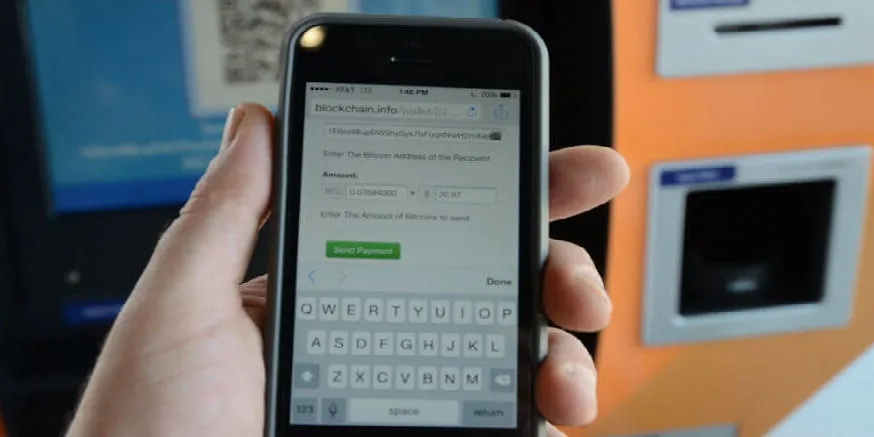Cryptocurrencies have been around for several years, with Bitcoin coming into existence in 2009. But virtual currency has gained most of its popularity in the last two years, causing the mobile development community to take notice. One of the most significant developments is blockchain, which is a clever and highly secure piece of technology that will be useful for applications far outside the cryptocurrency realm. So what is blockchain and how can your mobile app developer leverage this technology to revolutionize peer-to-peer mobile security?
What is Blockchain?
A blockchain is a distributed digital data storage platform that typically serves as a ledger or recordkeeping database, recording financial transactions for posterity. In addition to its robust encryption capabilities, blockchain has a modular structure which makes it adaptable, scalable and highly secure. Each record stowed in blockchain is called a “block.” The blocks are chained together using encrypted connections, and every block has a hash pointer that links it to the previous block in the chain.
Blockchain is secured using a complex system of cryptography. This means the data stored within blockchain would not only be extraordinarily difficult to access and decipher, but also resistant to data modification. This is key, as data modification is one of the most useful tools in the hacker’s arsenal. Once data is recorded in a block, that record becomes indelible, and it’s impossible to alter the record without modifying all the subsequent blocks that sit along the chain.
Bitcoin was the first to use blockchain technology as a method of recording all transactions. The development of blockchain was significant because it successfully eliminated the problem of “double spending,” whereby a unit of currency was spent multiple times. And as a decentralized architecture, blockchain provides consumers an unparalleled level of confidence and security.
How Can Developers Use Blockchain for Peer-to-Peer Mobile Payments and Security?
It’s clear that blockchain is a revolutionary piece of technology, but how can mobile developers harness the power of blockchain? Well, there are many opportunities emerging around peer-to-peer mobile payments and security.
Peer-to-Peer Mobile Payments
Peer-to-peer mobile payments (and other transactions or communications) are inherently less secure than a centralized system that’s based on a trusted server. With a peer-to-peer configuration, you have a collaborative comprised of computers and devices that share information directly, without a centralized server in place. This translates into significant vulnerability during the data transmission process. There is also a lot of vulnerability surrounding the data that’s stored on a device—or node—that’s part of a peer-to-peer network because these devices usually lack the encryption capabilities and high-level security measures that would be in place on a centralized server.
Many developers use (or would like to use) decentralized peer-to-peer mobile networks for their applications, as P2P brings many benefits. Peer-to-peer networks tend to be faster and more reliable, with little chance of an outage or downtime since it’s unlikely that hundreds or thousands of nodes would crash at once. P2P networks are also relatively simple and affordable, both to establish and maintain. Blockchain makes it possible for developers to leverage the benefits of a peer-to-peer mobile network in a secure manner. Plus, this high-level security helps promote greater confidence amongst the app’s users.
Already, we’re beginning to see mobile apps that leverage blockchain technology. Gliph is a digital marketplace that allows users to buy and sell items, with payments processed with blockchain technology. Fold is another significant player that is utilizing blockchain to allow users to purchase home goods, groceries and other items from large retailers such as Whole Foods and Target. The sky is truly the limit when it comes to leveraging blockchain for financial transactions and potentially some new and innovative uses. In fact, iOS 10 now allows for blockchain payments thanks to a partnership with Circle. This opens the door to a new realm of Apple-friendly apps that involve peer-to-peer mobile payments.
Using Blockchain in App Development
Could your next app development project benefit from blockchain? If so, you’ll need a mobile developer who’s on the cutting-edge and ready to craft an app interface that uses this highly-secure technology to the fullest. At 7T, our developers specialize in many of the newest emerging technologies, from blockchain and high-level encryption to predictive analytics, augmented reality, virtual reality, artificial intelligence and natural language processing. So when you turn to our team, your imagination is really the only limitation.
Based in Dallas, 7T serves Austin and Houston, with clients scattered across the United States. So no matter where you’re located, we encourage you to reach out to our team today to discuss your project.










